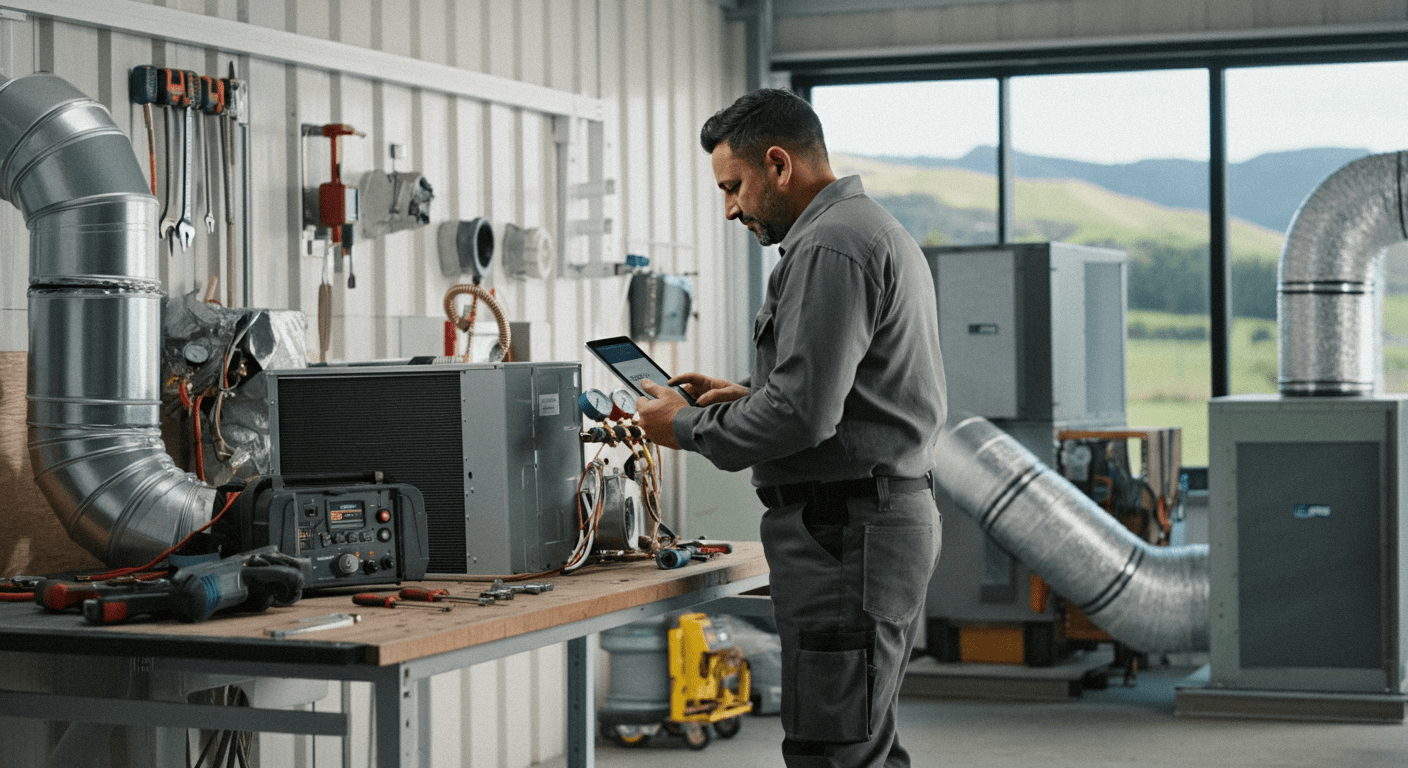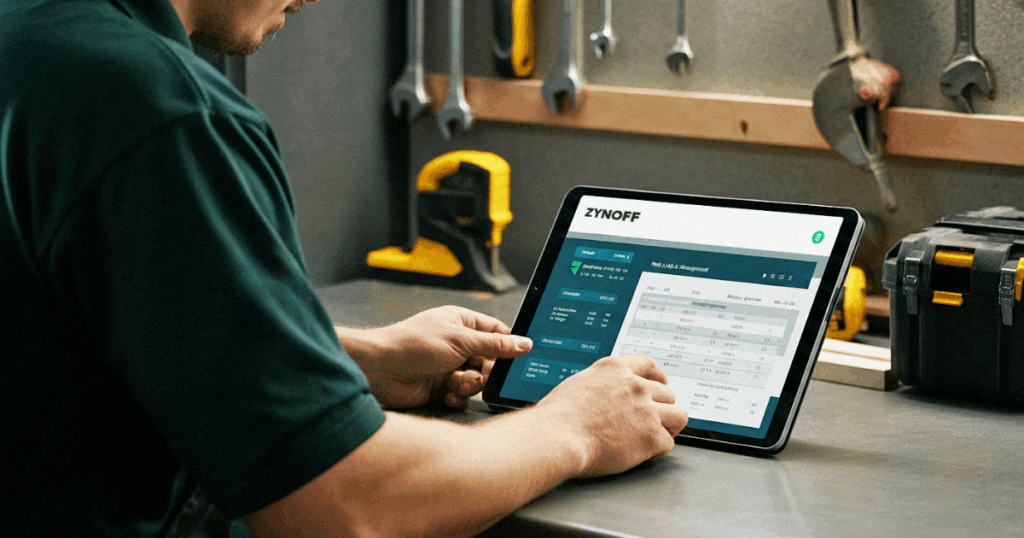HVAC technicians specialising in heating, ventilation and air conditioning systems ensure comfortable and healthy indoor environments throughout New Zealand. They are paid according to their years of experience, geographical location and work responsibilities. This article provides a comprehensive overview of HVAC technician salaries in New Zealand, focusing on both experienced professionals and apprentices.
Salary Overview
Several factors, including skills, experience and the region of employment, influence HVAC technician salaries in New Zealand.
- Early-career positions generally offer around NZD 27 per hour.
- Qualified HVAC technicians usually earn around NZD 32.11 per hour, translating to an annual salary of approximately NZD 50,000 to NZD 95,000.
- Highly experienced professionals who manage teams or own businesses can earn even higher salaries.
HVAC tech pay rate by City
The following table outlines the average annual salaries and hourly rates for HVAC technicians across major cities in New Zealand:
| City | Average Annual Salary (NZD) | Average Hourly Rate (NZD) |
| Auckland | $85,261 | $41.00 |
| Wellington | $82,539 | $40.00 |
| Christchurch | $80,000 | $38.46 |
| Hamilton | $75,000 | $36.06 |
| Dunedin | $70,000 | $33.65 |
| Nationwide Average | $75,000 – $80,000 | $36.06 – $38.46 |
These figures indicate that HVAC jobs are well-paid, especially in larger cities like Auckland and Wellington, where the demand for skilled technicians is higher.
What HVAC Technicians do
HVAC technicians perform several different tasks involved in the work of heating and cooling systems. Their duties may include:
- Assisting clients with various HVAC systems like furnaces, air conditioners, ductwork, and ventilation units.
- Installing refrigeration and air-conditioning systems
- Testing, adjusting and balancing systems for their appropriate functionality
- Checking refrigeration and air-conditioning systems for faults and performing necessary repairs
- Managing and supervising junior refrigeration/air-conditioning technicians
The HVAC tech pay rate reflects the expertise required to perform these tasks effectively.
Skills and Knowledge Required
HVAC technicians must possess a diverse set of skills and knowledge to perform effectively in their roles:
- Mechanical and Electrical Systems: it is essential to be familiar with how such systems work, including installation and maintenance.
- Gas Behaviour: If a problem occurs, it is essential to know how the various gases under consideration react under multiple pressure and temperature conditions.
- Essential Physics and Chemistry: A fundamental understanding of physics and chemistry enables one to understand how the systems work.
- System Evaluation: Technicians should be familiar with the functionality, advantages and disadvantages of various heating, air conditioning and ventilation systems.
- Technical Drawings: The ability to interpret building plans and technical drawings is vital for installation tasks.
Entry Requirements
No academic qualifications are specifically required for this occupation, but many employers prefer candidates pursuing or completing relevant qualifications. To achieve full qualification, individuals must:
- Complete an apprenticeship.
- Obtain a New Zealand Certificate in Refrigeration and Air Conditioning – Trade (Level 4), overseen by Competenz.
- Hold a driver’s licence.
Additionally, helpful experience in plumbing, gas fitting or electrical work can enhance job prospects.
Registration and Compliance
Refrigeration/air-conditioning technicians must be qualified and hold an Electrical Workers Registration Board (EWRB) licence. Applicants using compressed gases must also complete an approved filler compliance certificate to guarantee that the standard will be met.
Career Specialisation options:
- Residential HVAC: Focusing on servicing and maintaining home air conditioning systems.
- Commercial HVAC: Working on larger systems in buildings like offices and retail spaces.
- Commercial Refrigeration: Specialising in installing and maintaining refrigeration systems in supermarkets and other commercial settings.
The demand for HVAC professionals in these specialisations is rising, predominantly because Immigration New Zealand lists HVAC as a skill shortage industry. This could further impact salary levels and job opportunities.
Apprentice HVAC Technicians
Apprentice technicians typically start at the training minimum wage (NZD 18.52) or the standard minimum wage (NZD 23.15). They must complete an apprenticeship, which usually lasts two to four years. As they gain skills and complete necessary unit standards, their pay increases. This pay range is influenced by location and the employer’s specific pay structure.
Career Options and Progression
The HVAC field offers numerous career pathways. Apprentices can progress into roles such as:
- Senior HVAC Technician
- Service Manager
- Business Owner (for those who establish their own service companies)
With experience, technicians may also choose to specialise in areas such as commercial refrigeration or air conditioning systems design.
Entry Requirements
To become an HVAC technician apprentice in New Zealand, candidates must meet several entry requirements:
- Be a New Zealand citizen or permanent resident.
- Be at least 16 years old (unless granted an early leaving exemption).
- While not mandatory, holding the National Certificate in Educational Achievement (NCEA) Level 2 or equivalent is beneficial.
- Candidates must be employed in a relevant position within an engineering or manufacturing organisation and have a signed apprenticeship training agreement.
In conclusion, New Zealand’s HVAC technicians receive competitive salaries that reflect their skills and experience. With a solid foundation in mechanical systems and ongoing professional development through apprenticeships, individuals can create successful careers in this necessary field.




